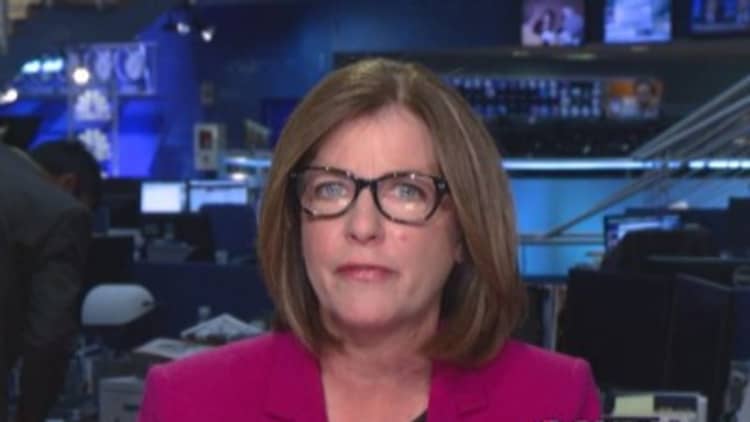
Geopolitics are likely to dominate markets Friday, with traders sensitive to even the small developments ahead of the weekend.
After trading lower overnight, stock futures turned higher in the 7 a.m. ET hour, after a news report quoting a Russian official saying Russia is seeking to de-escalate the Ukraine conflict. European stock markets came off their lows.
"We saw a comment yesterday that was along the same line," said Peter Boockvar, chief market strategist at Lindsey Group. "This is kind of repeat of that. We've been following Europe the last couple of days. Just as Europe bounced back, we followed."
Bond yields moved higher, with the 10-year yield at 2.39 percent but still below Thursday's close. The German bund set a new low yield Friday and was at 1.05 percent.
Stocks wobbled Thursday, but took clear hits after several headlines, including reports that the U.S. was weighing airstrikes and humanitarian aid to help Iraqis trapped on a mountaintop by rebels. Bonds rallied, the euro slid against the dollar and gold firmed.
Iraq will be in focus Friday and traders will keep an eye on oil, which was trading slightly higher on Iraq concerns. U.S. military aircraft carried out a mission to drop food and other supplies to the Iraqis, after the market close.
President Obama in a special address Thursday night said the U.S. would only carry out air strikes against the Sunni radical group if necessary.
"I think that people were looking for an excuse to get out of longs. There's some people who still fear that (Fed Chair Janet) Yellen is going to sound hawkish at Jackson Hole," said Marc Chandler, Brown Brothers Harriman chief currency strategist.
Fed officials hold their annual symposium in Jackson Hole, Wyoming, Aug. 22.Chandler said investors he speaks with have been anticipating rocky markets and have been building up cash.
"The question is how big is the pullback before they start buying," he said.
Read More
Nervous investors loaded up on bonds Thursday, driving the 10-year yield to 2.40 percent in late trading, and to the lowest close since June 2013 of 2.41 percent.
The move lower in yield came even as the four-week average for U.S. jobless claims fell to an 8-1/2 year low.
Russia and Ukraine also spooked markets. Stocks traded lower Thursday morning after comments from NATO Secretary General Andres Fogh Rasmussen. Rasmussen, while visiting Ukraine, called on Russia "to step back from the brink" and withdraw troops from the Ukraine border.
"One could make a case that we have at least 20 basis points of global risk premium built in to the back of the curve, if not 25 basis points," said Adrian Miller, director of fixed-income strategy at GMP. "This is a clear indication that the geopolitics is trumping consistent data that shows the economy is improving."
Miller said from a risk/reward perspective it would not make sense for Russian President Vladimir Putin to invade Ukraine, and he does not expect it. But he added that Putin is unpredictable.
Read MoreTerrific opportunity to invest in Russia: Pro
Markets were also looking for more clarity on future easing from European Central Bank President Mario Draghi, when he spoke after the ECB's rate meeting Thursday morning. "He didn't tell us anything we didn't know. People interpreted him a little bit dovish, downbeat on the economy," Chandler said.
The , meanwhile, failed to hold its 100-day moving average at 1,913, a negative sign to some traders.
Read MoreWhat this 'Death Cross' says about market weakness
As of Thursday's close, the S&P was 4.1 percent off its high, at 1,909. The Dow was 4.6 percent from its highs, losing 75 points Thursday to end at 16,368.
Individual stocks and sectors have been correcting more than the indexes. Dow stocks trading well below their 52 week highs include Boeing, off 17 percent since January; McDonalds, off 10 percent since May; Pfizer off 15 percent since March and Visa off 11 percent since January. American Express is off more than 10 percent since July.
Economic reports expected Friday include productivity and costs at 8:30 a.m. and wholesale trade at 10 a.m. Earnings are expected from Sotheby's, Brookfield Asset Management and Brazil's Petrobras.
—By CNBC's Patti Domm


